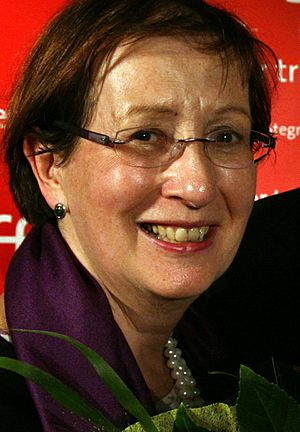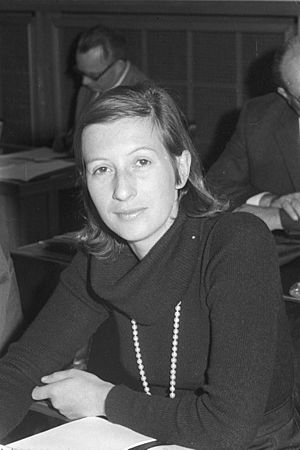Heide Simonis facts for kids
Quick facts for kids
Heide Simonis
|
|
|---|---|

Simonis in 2009
|
|
| Minister-President of Schleswig-Holstein | |
| In office 19 March 1993 – 27 April 2005 |
|
| Deputy | Claus Möller (1993–1996), Rainder Steenblock (1996–2000), Annemarie Lütkes (2000–2005) |
| Preceded by | Björn Engholm |
| Succeeded by | Peter Harry Carstensen |
| Deputy Minister-President of Schleswig-Holstein | |
| In office 10 March 1993 – 19 March 1993 |
|
| Appointed by | Björn Engholm |
| Preceded by | Günther Jansen |
| Succeeded by | Claus Möller |
| Schleswig-Holstein Minister of Finance | |
| In office 5 May 1988 – 19 March 1993 |
|
| Appointed by | Björn Engholm |
| Preceded by | Roger Asmussen |
| Succeeded by | Claus Möller |
| Member of the Bundestag | |
| In office 3 October 1976 – 8 June 1988 |
|
| Member of the Kiel Municipal Council | |
| In office 1971–1976 |
|
| Personal details | |
| Born |
Heide Steinhardt
4 July 1943 Bonn, Germany |
| Died | 12 July 2023 (aged 80) Kiel, Germany |
| Nationality | |
| Political party | Social Democratic Party (SPD) |
| Alma mater | University of Kiel, University of Erlangen–Nuremberg |
Heide Simonis (born 4 July 1943 – died 12 July 2023) was an important German politician and writer. She was a member of the SPD, a major political party in Germany. From 1993 to 2005, she held a very important job: she was the Minister-President of Schleswig-Holstein. This made her the first woman ever to lead a state government in Germany's history. She was also the only woman to do this in the 20th century.
Contents
Her Early Life and Studies
Heide Simonis finished high school in 1962 in Nürnberg. After that, she went to university. She studied Economics and Sociology at the University of Erlangen-Nürnberg and the University of Kiel. She earned her degree in economics in 1967. After finishing her studies, she worked in various jobs.
Her Political Journey
Heide Simonis joined the SPD in 1969. This was the start of her long political journey. In 1976, she was elected to the German Bundestag. The Bundestag is like the parliament or main law-making body for all of Germany.
Later, in 1992, she became a member of the legislature of Schleswig-Holstein. This is the parliament for the state of Schleswig-Holstein.
Becoming Minister-President
On 19 May 1993, Heide Simonis was chosen to be the Minister-President of Schleswig-Holstein. This happened after the previous Minister-President, Björn Engholm, stepped down due to a problem. Her election was a big moment because she was the first woman in Germany to reach such a high political position.
Facing Elections
In the state election in 1996, her party, the SPD, got fewer votes than before. Their support dropped from 46.2% to 39.8%. However, Simonis was still able to form a coalition government. This means her party teamed up with another party, the Greens, to have enough votes to lead the state.
In February 2000, the SPD's support grew again to 43.1%. This happened during a time when the main opposing party, the CDU, was facing issues with party funding.
In 2005, the SPD's election campaign focused a lot on Heide Simonis's popularity. But the state was facing a difficult economic situation. Because of this, the SPD lost a lot of support and dropped to 38.7%. For the first time in almost twenty years, they received fewer votes than the CDU.
Stepping Down
On 17 March 2005, Heide Simonis tried to be re-elected as Minister-President of Schleswig-Holstein. But she failed in four votes by the Schleswig-Holstein Landtag. In the first vote, she got 34 votes, and her opponent, Peter Harry Carstensen from the CDU, got 33 votes. Two people did not vote for anyone. Neither of them got the absolute majority (35 votes) needed to win.
In the next two votes, both candidates still got 34 votes. One member from the SPD, Greens, and SSW alliance did not vote. An unusual fourth vote had the same result. Because she could not get enough votes, Heide Simonis stepped down as Minister-President of Schleswig-Holstein.
Helping Children with UNICEF
From 2005 until February 2008, Heide Simonis worked as the head of the German branch of UNICEF. UNICEF is a global organization that helps children around the world. She resigned from this role because of problems related to donations to the organization during her time there.
Her Life Outside Politics
In 1967, Heide Simonis married Udo E. Simonis, who was a university professor. Later in her life, Simonis became ill with Parkinson's disease. She passed away on 12 July 2023, at her home in Kiel.
Special Recognitions
Heide Simonis received several honors for her work:
- 2014: She was made an Honorary citizen of Schleswig-Holstein.
- 2018: She received the Willy Brandt Medal.
Want to Learn More?
 In Spanish: Heide Simonis para niños
In Spanish: Heide Simonis para niños
- List of Minister-Presidents of Schleswig-Holstein
 | Toni Morrison |
 | Barack Obama |
 | Martin Luther King Jr. |
 | Ralph Bunche |


